Bahçeşehir University (BAU) provides a neutral, academically grounded, and safe platform where stakeholders with diverse political and social perspectives can engage in open and evidence-based dialogue on critical national and global challenges.
In line with its commitment to academic freedom and institutional neutrality, BAU ensures that such discussions take place without restriction or bias, within the limits of the legal and ethical frameworks governing higher education. This approach reinforces the university’s role as a trusted convener that connects policymakers, scholars, civil society actors, and the public in a setting of mutual respect and intellectual rigor.
Through conferences, policy forums, and collaborative projects, BAU regularly hosts events that allow frank and inclusive exchanges among representatives of government, opposition, and independent institutions. The university’s non-partisan stance guarantees that every participant, regardless of affiliation or ideology, has the opportunity to present their views and engage constructively.
By maintaining this open environment, BAU not only contributes to better-informed public debate but also fulfills its mission to bring academic expertise to the service of democratic dialogue and policy development.
This commitment enables the university to support evidence-based decision-making and strengthen the culture of transparency, accountability, and civic participation in Turkey and beyond.
The following section provides examples from the reporting year illustrating how BAU functioned as a neutral and inclusive platform facilitating constructive engagement among diverse political stakeholders.
1.BAU Politics School – A Neutral Platform for Dialogue
The image below shows official promotional poster and the content of Bahcesehir University’s Politic School 2024.
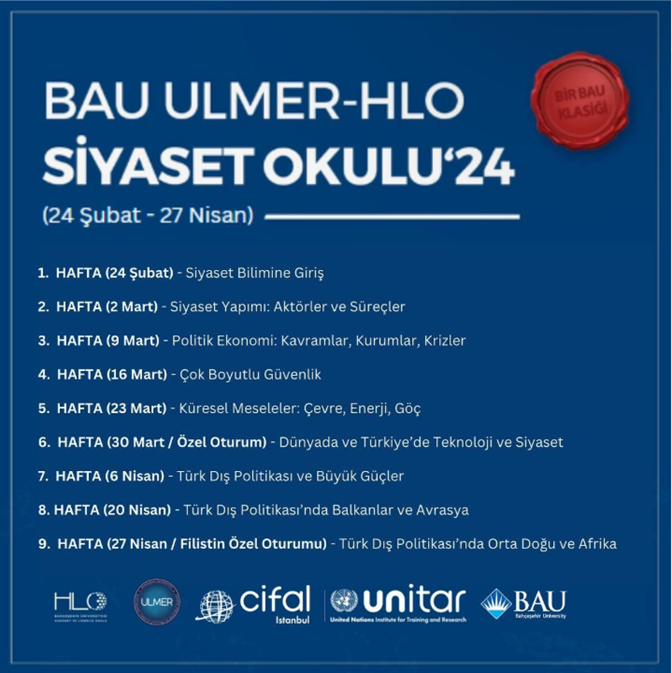
Established under Bahçeşehir University’s International Leadership Practice and Research Center (ULMER), the BAU Politics School has been a pioneering program in Turkey for over two decades. As part of the Government Leadership School, it stands out as one of the country’s first and most enduring initiatives that create a neutral, academically grounded, and safe environment for political dialogue and leadership development.
The most distinctive feature of the BAU Politics School is its ability to bring together politicians, lawmakers, public officials, and thought leaders from across Turkey’s diverse political spectrum. The program provides a non-partisan platform where participants engage in open, respectful, and evidence-based discussions on national and global issues — in line with the university’s commitment to academic freedom and institutional neutrality.
Over the years, the Politics School has welcomed a wide range of distinguished figures, including presidents, prime ministers, ministers, ambassadors, members of parliament, and senior bureaucrats. Its alumni network includes 30 members of parliament, 9 ministers, and numerous deputy ministers and senior civil servants from different political backgrounds.
With its annually updated curriculum, the program addresses emerging policy challenges in governance, economy, diplomacy, sustainability, and democratic participation. By bringing together individuals with differing perspectives, the Politics School promotes cross-ideological understanding, constructive debate, and mutual respect, helping to strengthen democratic dialogue and civic engagement in Turkey.
This long-standing initiative reflects BAU’s role as a trusted convener and facilitator in the political arena — fostering informed policy discussion and reinforcing the connection between academic expertise and public decision-making.
In 2024, the program convened academics, policymakers, and political figures from diverse ideological and professional backgrounds to discuss some of the most pressing issues on both the national and international agenda — including the Israel–Palestine conflict, Turkish foreign policy, national security, migration, environmental policy, and energy transition.
The images below show official promotional posters and the contents of Bahcesehir University’s Politic School for previous years.
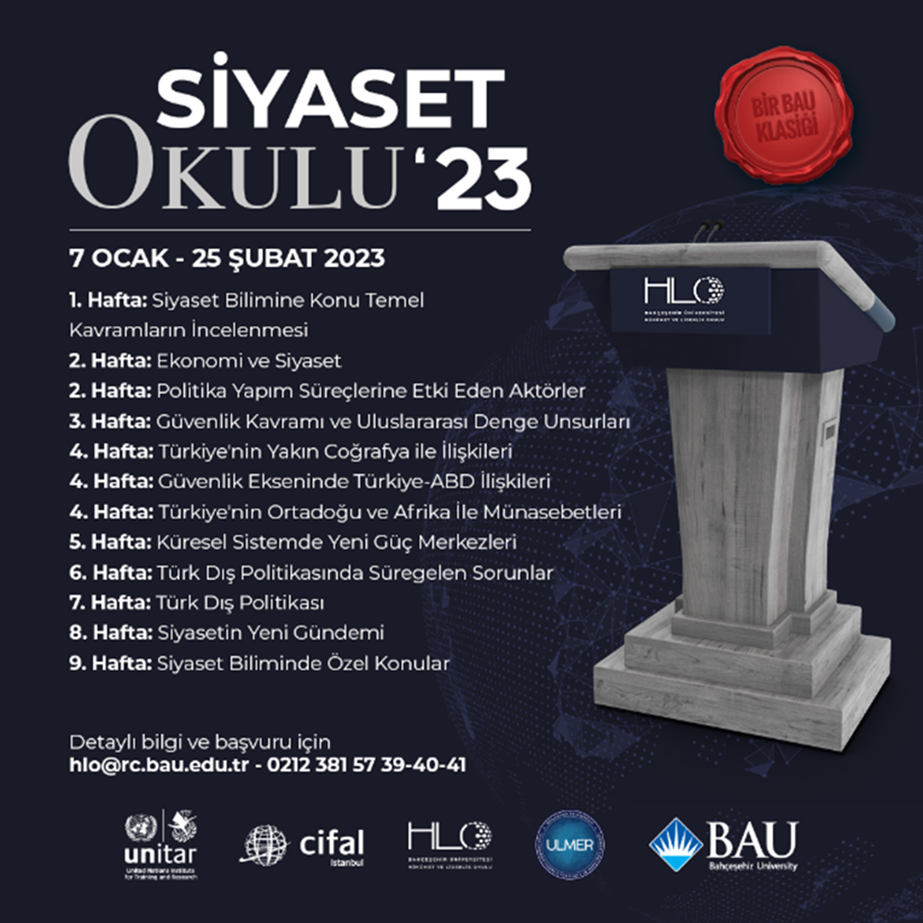
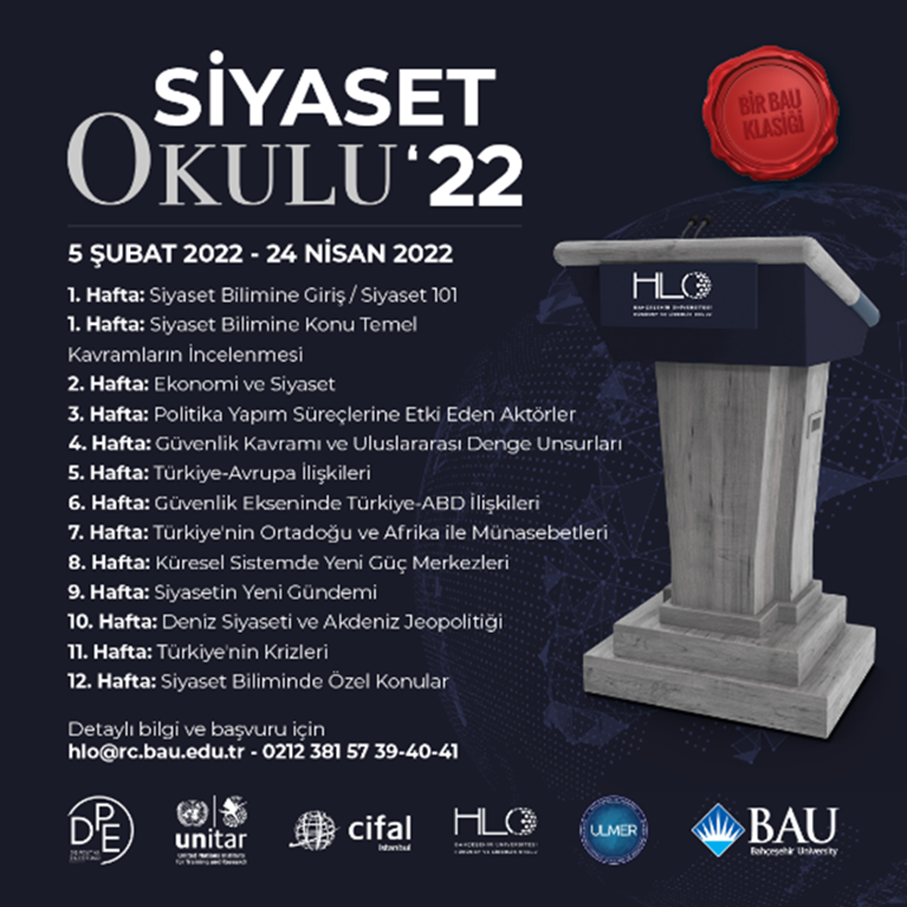
2.BAU Rotary Peace Center – A Neutral Platform for Peacebuilding and Policy Development in the MENA Region

The image below shows a screenshot from the official Rotary International website listing Bahcesehir University as one of the Rotary Peace Centers, serving as a neutral platform for peacebuilding and policy development in the MENA region.
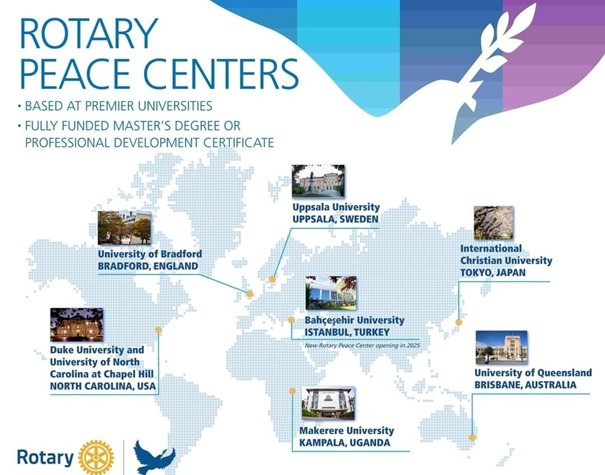
Since 2023, Bahçeşehir University (BAU) has been the only university in Türkiye to host the Otto & Fran Walter Rotary Peace Center, serving the Middle East and North Africa (MENA) region in partnership with CIFAL Istanbul, which operates under the United Nations Institute for Training and Research (UNITAR).
This collaboration positions BAU as a regional hub for peace education, dialogue, and policy innovation, combining academic excellence with practical field engagement.
The BAU Rotary Peace Center was established with the mission of enhancing human capacity for conflict resolution, peacebuilding, and sustainable development. It provides a safe, neutral, and academically guided environment where individuals from diverse cultural, political, and professional backgrounds come together to exchange ideas, share experiences, and collaborate on solutions to regional and global challenges.
As a platform grounded in impartiality and inclusion, the Center embodies BAU’s commitment to fostering open and evidence-based dialogue, ensuring that participants can engage in frank discussions free from political or institutional bias.
Each year, the Peace Center welcomes fellows and professionals from governments, NGOs, academia, and international organizations across the MENA region. The program combines academic coursework, seminars, workshops, and field-based projects, enabling participants to translate theoretical knowledge into practical action. The curriculum emphasizes themes such as peacebuilding, conflict transformation, humanitarian diplomacy, migration, climate resilience, and community development, reflecting the interconnected nature of today’s global challenges.
The BAU Rotary Peace Center operates as part of Rotary International’s global network of peace centers, linking BAU to a worldwide community of practitioners, researchers, and institutions dedicated to advancing peace and human security. Its academic program, conducted in English, is hosted at BAU’s Future Campus in Istanbul, providing a multicultural environment that mirrors the diversity of the region it serves.
By hosting this Center, BAU strengthens its role as a trusted convener and facilitator of dialogue among actors with differing perspectives. The initiative directly supports the University’s vision of serving as a neutral platform for inclusive discussion, where academic expertise informs policy practice and mutual understanding.
Through this work, BAU contributes meaningfully to Sustainable Development Goal 16 (Peace, Justice and Strong Institutions) and Goal 17 (Partnerships for the Goals) — promoting good governance, cooperation, and lasting peace through education and collaboration.
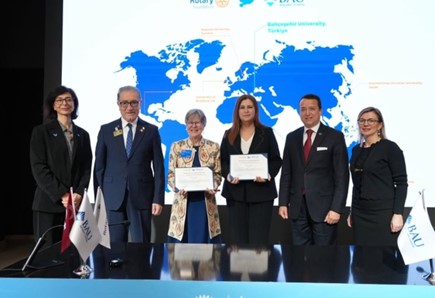
3.BAU International Forum on Political Economy – “The Future of the International System and Global Energy”
The images below show official poster and content of BAU International Forum on Political Economy.
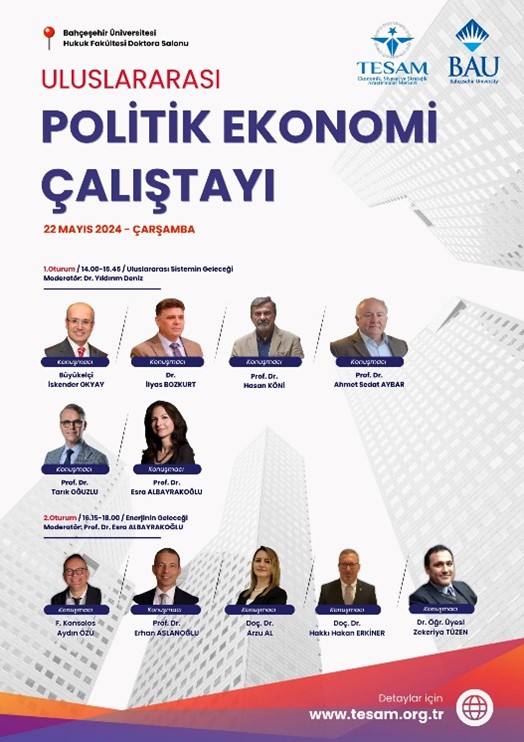
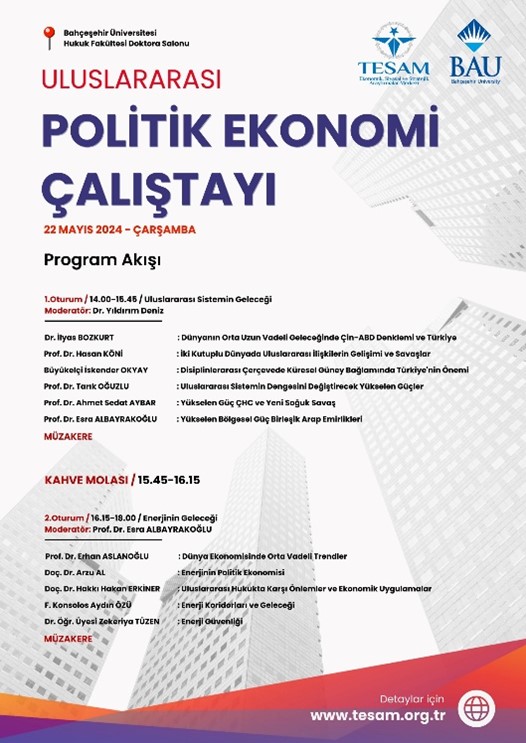
On 22 May 2024, Bahçeşehir University (BAU), in cooperation with the Center for Economic, Strategic and Social Research (TESAM), organized the BAU International Forum on Political Economy at the Faculty of Law’s Doctorate Hall.
The event brought together academics, diplomats, policymakers, and experts from diverse ideological and institutional backgrounds to engage in open and evidence-based dialogue on the changing dynamics of the global political and economic system.
The forum was structured into two main sessions:
This interdisciplinary and multi-perspective forum provided a neutral academic setting where participants representing different political, economic, and theoretical viewpoints could engage in constructive debate.
By facilitating mutual understanding and collaborative problem-solving, the event embodied BAU’s commitment to acting as a safe and impartial platform for inclusive dialogue on regional and global governance.
Through this initiative, Bahçeşehir University contributed to Sustainable Development Goal 16 (Peace, Justice and Strong Institutions), Goal 7 (Affordable and Clean Energy), and Goal 17 (Partnerships for the Goals) — promoting transparency, peaceful exchange of ideas, energy cooperation, and multilateral partnerships that advance global stability, sustainability, and institutional resilience.
4.BAU Diplomat School – A Neutral Platform for Political Stakeholders
The image below shows official poster and content of BAU Diplomat School 2024.
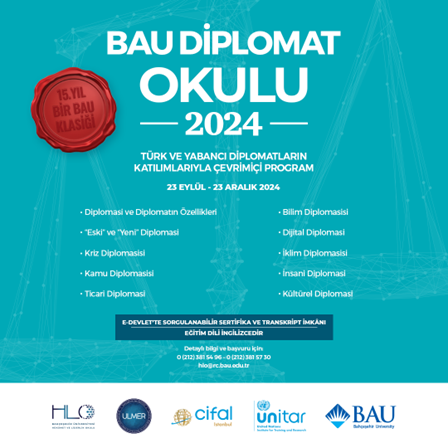
Bahçeşehir University’s International Leadership Practice and Research Center (ULMER), under the Government Leadership School, organizes the BAU Diplomat School, a pioneering initiative designed to enhance the capacity and understanding of policymakers, diplomats, and public officials on global developments and challenges.
Celebrating its 15th year in 2024, the program continues to provide a neutral, academically guided, and inclusive platform where individuals from different political backgrounds and professional experiences come together to engage in open and constructive dialogue.
Over the years, the BAU Diplomat School has hosted a wide range of distinguished figures, including ministers, ambassadors, members of parliament, senior bureaucrats, policy advisors, thought leaders, and veteran academics — individuals who play key roles in shaping Turkey’s and the world’s diplomatic and foreign policy agendas.
It remains one of the few academic platforms in Turkey where diverse perspectives, ideologies, and political identities meet under the same roof to discuss complex issues in an impartial and academically safe environment.
As a comprehensive, long-standing, and non-partisan educational initiative, the BAU Diplomat School has become a model for how universities can contribute to public policy dialogue, capacity building, and global cooperation.
By bringing together academics, policymakers, and diplomats from diverse political traditions, the program nurtures critical thinking, informed discussion, and solution-oriented collaboration.
Through this initiative, BAU demonstrates its ongoing commitment to acting as a neutral convener and facilitator of international dialogue, advancing the principles of academic freedom, transparency, and inclusivity.
The Diplomat School directly contributes to SDG 16 (Peace, Justice and Strong Institutions) and SDG 17 (Partnerships for the Goals) by strengthening the link between education, diplomacy, and sustainable governance.
Program Overview and Curriculum
In 2024, the Diplomat School program runs online between 23 September and 23 December 2024, maintaining its 14-week structure with sessions held every Monday from 08:30 to 11:30.
The program is conducted entirely in English and combines theoretical and practice-oriented sessions, each followed by an interactive Q&A segment.
The 2024 curriculum has been comprehensively updated to address both classical and emerging dimensions of diplomacy, featuring modules on:
5.Bahçeşehir University Local Governance Academy 2024: A Neutral Platform for Policy Dialogue and Capacity-Building in Sustainable Urban Governance
The image below show official poster of Bahçeşehir University Local Governance Academy 2024.
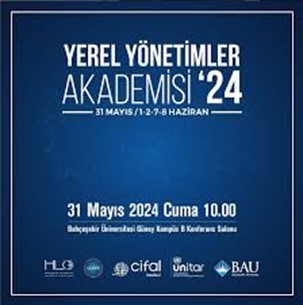
For more than two decades, Bahçeşehir University’s International Leadership Practice and Research Center (ULMER) has played a leading role in cultivating future policymakers and public leaders through its Government Leadership School. Established as one of Türkiye’s pioneering university-based leadership development institutions, the School has consistently provided comprehensive education programs, seminars, and projects designed to strengthen the capacity of individuals engaged in governance and public policy.
Building upon this long-standing tradition of excellence, the Local Governance Academy was launched under the Government Leadership School to extend ULMER’s mission to the local level. Recognizing the critical role that municipalities and local authorities play in achieving sustainable development, the Academy focuses on empowering local administrators and policymakers through specialized certification programs.
In the 2023–2024 academic year, the Local Governance Academy offered structured capacity-building training for municipal personnel, policy practitioners, and individuals aspiring to work in local governance. Its curriculum addresses a wide range of pressing issues, including urbanization and smart cities, digital transformation in public administration, migration and refugee management, environmental sustainability, and climate-resilient urban planning.
The program also aims to enhance the analytical and decision-making skills of participants, helping them adapt to the complex realities of modern urban governance. Through interactive sessions, case-based discussions, and applied learning modules, the Academy fosters a culture of participatory, inclusive, and data-driven policymaking.
The Academy represents an important example of education and capacity-building for policymakers, empowering local government representatives with knowledge and skills in sustainable urban management, social participation, disaster recovery, and environmental resilience.
Participants included nine mayors from different municipalities and political backgrounds across Türkiye, representing both metropolitan and regional administrations: Beşiktaş, Üsküdar, Avcılar, Beylikdüzü, Bağcılar, Fatih, Altınordu, Payas, and Onikişubat. In addition, senior public officials, such as Refik Tuzcuoğlu, Deputy Minister of the Ministry of Environment, Urbanization and Climate Change, participated alongside academics from Bahçeşehir University and other institutions, including Prof. Dr. Esra Hatipoğlu, Prof. Dr. Esra Albayrakioğlu, and Prof. Dr. Ebru Canan-Sokullu.
Bringing together leaders from different political parties and diverse professional backgrounds, the Local Governance Academy exemplified Bahçeşehir University’s commitment to serving as a neutral, inclusive platform for constructive dialogue. Through its academic expertise and nonpartisan engagement, BAU facilitates knowledge-sharing and cooperation between academia, local governments, and national institutions, contributing to evidence-based policymaking and good governance practices.
Strong Institutions) by linking research, training, and practical policy development for inclusive and sustainable local governance
The images below show weekly content and highlight pictures of Bahçeşehir University Local Governance Academy 2024.
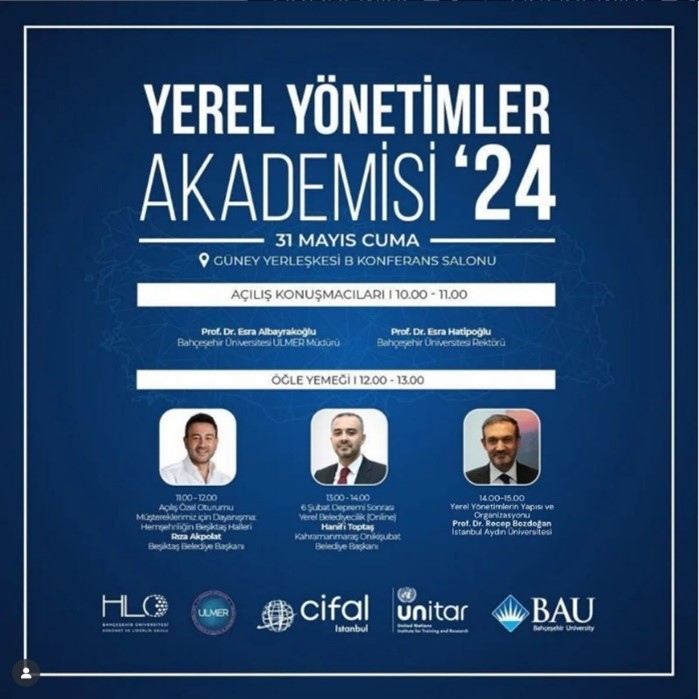
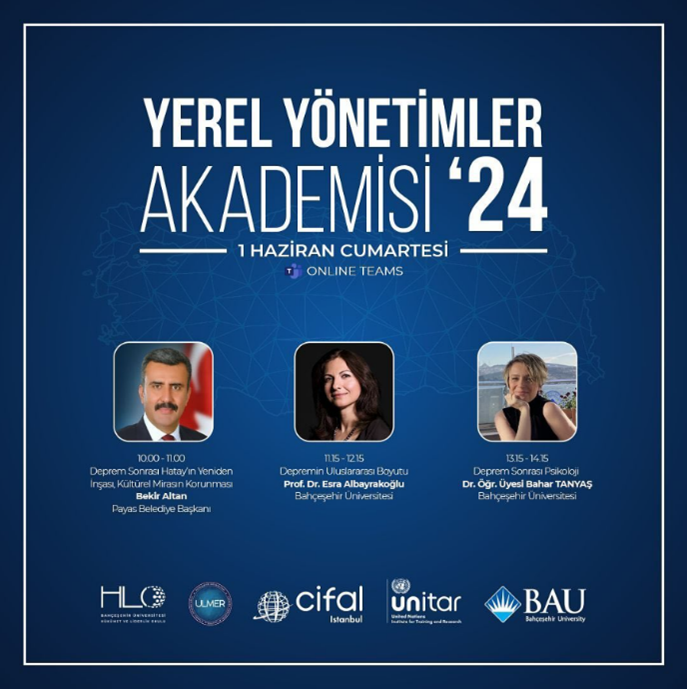
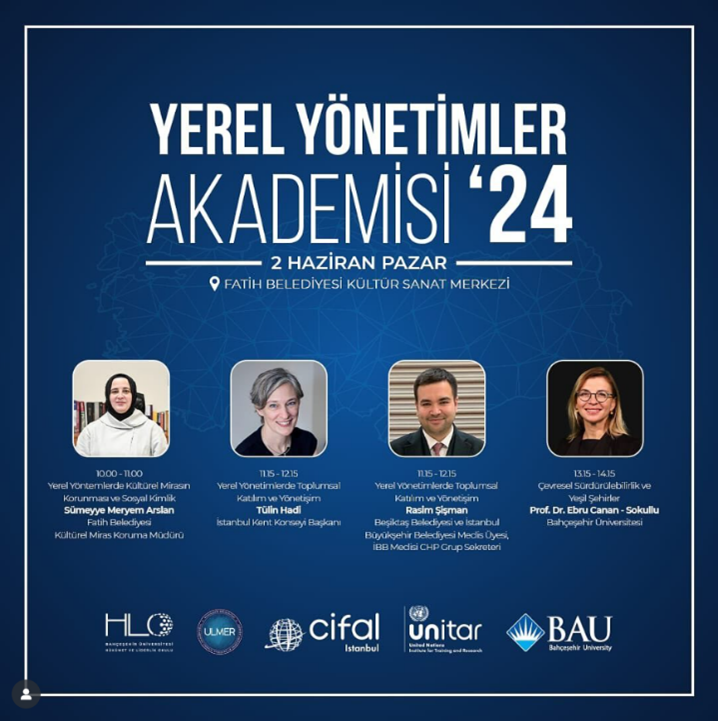
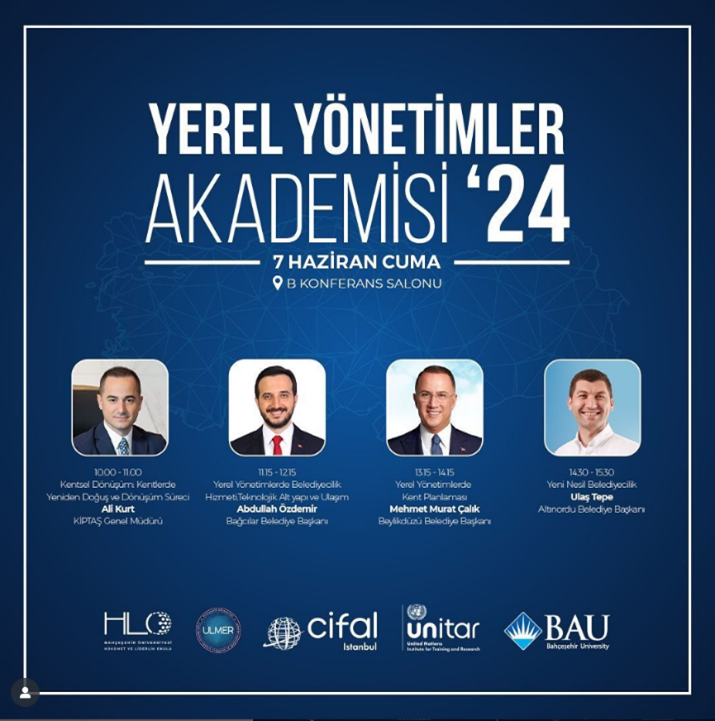
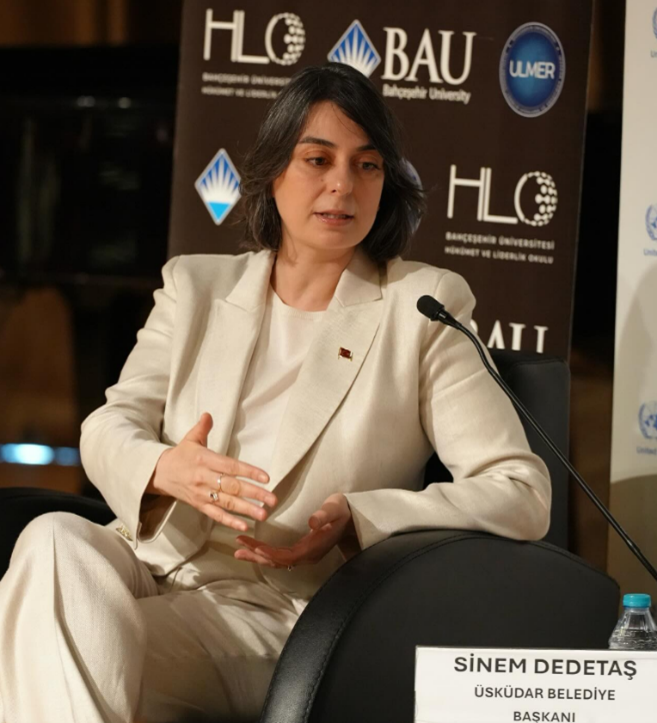
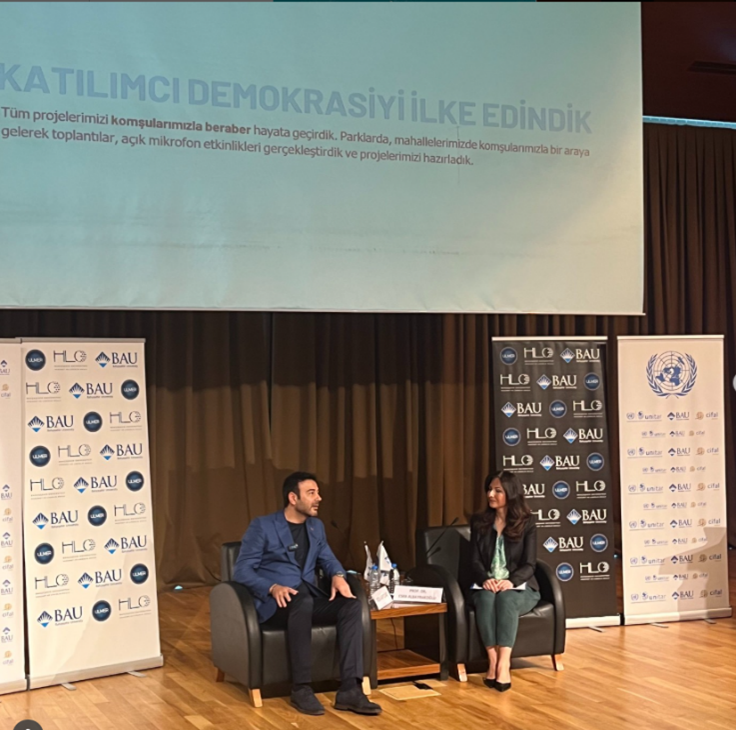
6.Bahçeşehir University Hosted a Multi-Stakeholder Panel on Justice and Media Relations
The images below show official poster and program schedule of Justice and Media Relations at BAU.
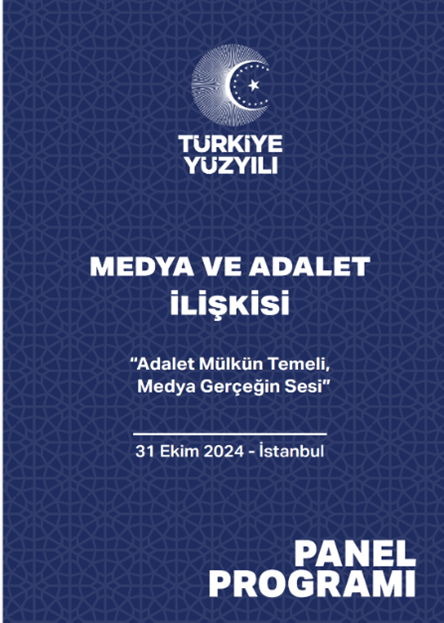
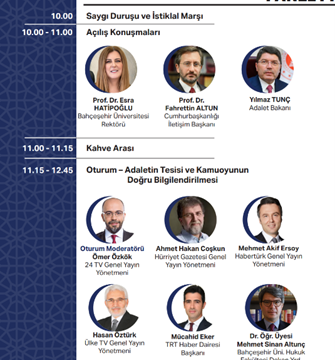
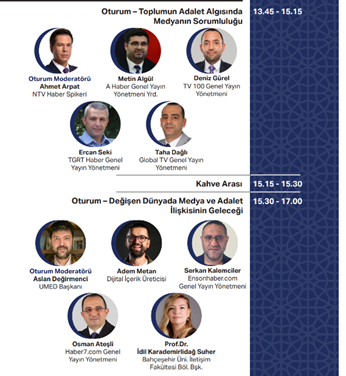
In October 2024, Bahçeşehir University (BAU) hosted the national panel titled “Justice and Media Relations: Justice as the Foundation of the State, Media as the Voice of Truth”
The event brought together government officials, media representatives from diverse political perspectives, academics, and students at BAU’s Beşiktaş Campus.
Through this initiative, BAU provided a neutral platform and a safe environment for open dialogue between policymakers, journalists, and scholars on the relationship between justice, freedom of expression, and responsible media.
By facilitating inclusive discussion among different viewpoints, Bahçeşehir University reinforced its commitment to SDG 16 – Peace, Justice and Strong Institutions, supporting transparency, dialogue, and social trust between the judiciary, media, and the public.